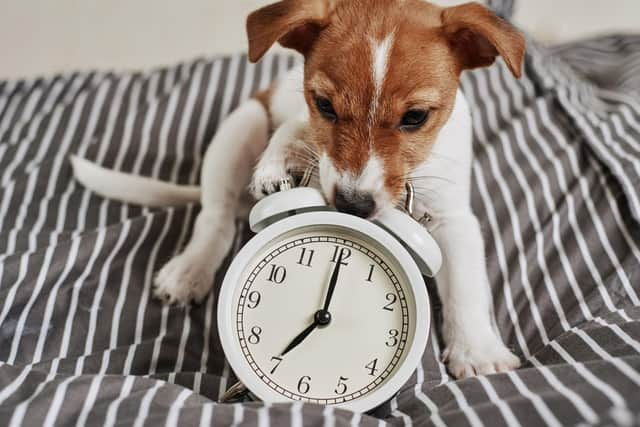Dogs and The Hour Change: Here's how the hour change affects your adorable dog - and what to do about it 🐶
Daylight Saving Time ends this weekend as the clocks go back, and while that means an extra hour in bed for us humans, the disruption can actually be quite unsettling for our four-legged friends.
But there are a few things that dog owners can do to help them out – and minimise the impact.
Advertisement
Hide AdAdvertisement
Hide AdJohn Smith, Pet Expert and Managing Director of online personalised pet store Yappy.com, explained: “The bi-annual clock change causes a slight disruption to our routine and sleeping pattern which only takes a couple of days to get used to, but the impact is bigger for our dogs. But how exactly does it affect them, and what can we do to prepare them?”
Here’s his advice.
Increases stress/anxiety
Dogs thrive off routine which is why so many have very precise times for eating meals, going for walks, waking up and going to bed. Any disruption to routine can increase stress and anxiety levels in our sensitive dogs, so it’s best to get ahead. The best way to prepare your dog is to gradually alter their routine by 10-15 minutes each day in the days leading up to the clock change – wake them later, feed them later, and walk them later if you can, so that when the clocks do change it won’t come as a surprise.
Causes confusion


As the clocks go back we see an average number of sunlight hours, half from 16 hours in the summer to just eight in the winter, and this can cause confusion for our four-legged friends. Dogs are like humans in that they have an internal body clock, they wake up and feel tired at similar times each day so for it to go dark earlier in the evenings will cause confusion.
For most of us it’s just not possible to only walk our dogs during sunlight hours – with many going to work and returning home in the dark. Instead just ensure that on those darker evenings you’re walking your pup in a well-lit area, so that they barely notice the difference.
Increases clinginess
The shorter days make the majority of us spend more time in our homes – there really is no better feeling than getting cosy in your home when it’s cold and dark outside. And while our dogs might love the fact we’re spending even more time with them, there is such a thing as becoming too reliant on us – particularly as our schedules will change again come spring when the clocks go forward.
It’s important that we give our dogs the same amount of attention all year round, the more the better! The less time we spend with our dogs, the more likely they are to suffer from separation anxiety, which is particularly common during daylight saving time.”
The clocks changing does have an impact on our dogs, but by gradually changing their routine it will avoid unnecessary stress and confusion – our four-legged friends are sensitive little souls so it’s only fair that we do everything we can to keep them happy and healthy!
Comments
Want to join the conversation? Please or to comment on this article.